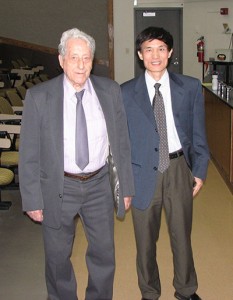
Peng Huang and George Sosnovsky
Associate Professor (tenure 09/01/2003), Department of Molecular Pathology, The University of Texas M. D. Anderson Cancer Center, Houston, TX, 9/2001-8/2007
Assistant Professor (non-tenure track 1995-1999; tenure track 1999-2001), Department of Experimental Therapeutics, The University of Texas M. D. Anderson Cancer Center, Houston, TX, 1/1995-8/2001
Assistant Biochemist (non-tenure track), Department of Clinical Investigation, The University of Texas M. D. Anderson Cancer Center, Houston, TX, 1/1992-12/1994
Research Associate, Department of Medical Oncology, The University of Texas M. D. Anderson Cancer Center, Houston, TX, 1/1991-1/1992
1990 The University of Texas Health Science Center at Houston, Graduate School of Biomedical Sciences, Houston, TX, PHD, Pharmacology
1982 Zhongshan Medical College, Guangzhou, China, MD, Medicine
Postgraduate Training
6/1990-11/1992 Postdoctoral Fellow, Department of Medical Oncology, The University of Texas MD Anderson Cancer Center, Houston, TX
1/1983-8/1984 Postgraduate Fellowship, Department of Clinical Pharmacology, Sun Yat-Sen University of Medical Sciences, Guangzhou, China
Our laboratory research are in the areas of metabolic alterations in cancer cells and mechanisms of action of novel anticancer agents. The goals our research programs are to investigate the foundamental changes in energy metabolism and redox regulation in cancer, to examine the molecular interaction between the cancer cells and anticancer drugs, and to develop novel strategies to selectively kill the malignant cells based on their metabolic alterations and survival pathways. Current research efforts are directed toward investigating the role of mitochondria in affecting glycolysis and drug-induced apoptosis, and examining the effect of oncogenic signals on mitochondrial respiration and ROS generation. Another important focus is the role of p53 and its associated molecules in sensing DNA damage by reactive oxygen species (ROS) and other genotoxic agents and the subsequent signaling for apoptosis. The understanding of the difference between the cancer cells and normal cells in their ATP metabolism and ROS/redox regulation will provide an important basis for developing novel agants and new strategies to selectively kill cancer cells and improve therapeutic activity and selectivity for cancer treatment.
Lecture 1, March 2011:
Metabolic Alterations in Cancer: Mechanisms and Therapeutic Implications
Cancer metabolism is an important area of research. This lecture will focus on two major metabolic changes frequently observed in cancer cells: increased aerobic glycolysis (the Warburg effect) and oxidative stress. The potential mechanisms that contribute to these metabolic alterations, including oncogenic signals, mitochondrial dysfunction, and tumor tissue microenvironment will be discussed. The role of such metabolic alterations in affecting cancer cell viability and drug sensitivity will also be explored in the context of developing new therapeutic strategies to effectively and preferentially kill cancer cells. Special emphasis will focus on mitochondrial dysfunction as a key event that links malignant transformation to metabolic alterations, and the relevant biochemical basis for developing novel therapeutic strategies.
Lecture 2 March 2011:
Novel Strategies to Target Metabolic Alterations in Cancer with Improved Therapeutic Selectivity
Increased glycolysis and oxidative stress are two prominent metabolic alterations in cancer cells. These biochemical changes may provide an important basis for developing new therapeutic strategies to selectively kill cancer cells. It is hypothesized that since cancer cells with mitochondrial dysfunction and compromised ability to produce ATP through oxidative phosphorylation may be more dependent on glycolysis for generation of ATP and metabolic intermediates for cell survival and proliferation, inhibition of this metabolic pathway by targeting the key glycolytic enzymes may preferentially impact cancer cells. Similarly, due to the active generation of reactive oxygen species (ROS), cancer cells are more dependent on antioxidants such as glutathione to counteract oxidative stress, rendering them highly vulnerable to redox-modulating agents. This seminar will focus on two metabolic intervention strategies for potential cancer treatment: (1) the use of glycolytic inhibitors such as 3-bromopyruvate and its analogs to block energy production in cancer cells, aiming at preferential killing of malignant cells with mitochondrial dysfunction, and (2) the use of redox-modulating agents such as PEITC to selectively target cancer cells with elevated ROS stress. Experimental evidence will be presented to illustrate the mechanisms of action of these two classes of compounds and their potential combination with conventional anticancer agents to improve therapeutic activity and overcome drug resistance.